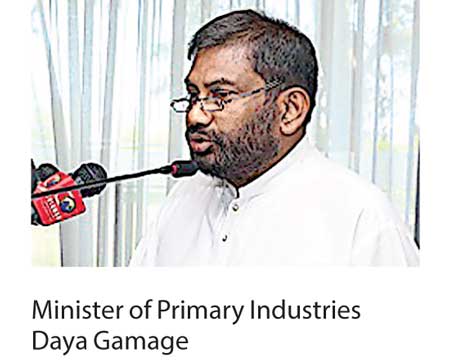Tuesday Feb 17, 2026
Tuesday Feb 17, 2026
Friday, 19 May 2017 00:00 - - {{hitsCtrl.values.hits}}
 The post harvest loss of fruits and vegetables in Sri Lanka is more than 40%, which is due to a lack of proper transportation, storage facilities and packaging systems, Minister of Primary Industries Daya Gamage said.
The post harvest loss of fruits and vegetables in Sri Lanka is more than 40%, which is due to a lack of proper transportation, storage facilities and packaging systems, Minister of Primary Industries Daya Gamage said.
“The Ministry of Primary Industries together with Agriculture Ministry, Ministry of Rural and Fisheries Ministry will set up 21 export-oriented agriculture zones to rectify that,” Minister Gamage said at the inauguration of a workshop at Water’s Edge, Battaramulla last week.
The theme of the event was ‘Emerging Food Safety and Quality Risks in South Asia: Challenges and Opportunities for Sri Lanka’. It was organised by the Ministry of Primary Industries and Institute of Policy Studies in collaboration with the International Food Policy Research Institute.
Food safety experts from India, Bangladesh, Nepal, and Sri Lanka discussed changes in the region’s food system, including rising urban consumption and the new challenges it presents for policy makers to adopt stringent food quality standards.
Speaking further, Minister Gamage said that like other South Asian countries, Sri Lanka’s population has grown significantly in recent years, most notably in urban areas. The first high tech agriculture zone will be set up in Anuradhapura, to be followed by 10 more, he said.
“These zones will provide training and know-how for farmers to prevent post harvest waste. Further, those zones will provide storage facilities with deep freezers and proper packing methods for farmers,” Minister Gamage said.
He also said that these economic zones will provide advice on how to reduce post harvest waste when transporting, storing and packaging with the use of new technology to be obtained from developed countries.
Minister Gamage also said that since the agricultural sector could be converted into a major export business they are now looking at investors with an initial investment of Rs. 10 million to invest Rs. 100 million. This could be implemented by the Ministry of Primary Industries.
The Ministry of Primary Industries will grant 5% and another bank loan will be arranged to go up to Rs. 100 million for the prospective investors who are willing to invest Rs. 10 million, Minister Gamage said.
The International Food Policy Research Institute (IFPRI) Director South Asia P.K. Joshi said that when compared to other South Asian countries Sri Lanka is doing well where the food safety area is concerned.
He also said that urbanisation is driving huge changes in how small farmers connect with markets to sell their goods, the choices people make about their diets and the way that food systems are governed.
Sri Lankan farmers are now working to meet urban food demands and improve food safety through enhanced networks and increased access to technology, Joshi added.
Joshi presented key findings from the institute’s 2017 Global Food Policy Report to the Minister Gamage.
There is a growing concern in the topic of safety in the food industry and its counterparts. How certain are we that the food we consume on a daily basis, is in fact healthy or safe? The world today, has grown to adopt a variety they call, ‘SMART Food’ meaning: Safe, Modern, Affordable, Resourceful and Total (complete in calories, vitamins, proteins, minerals and other nutrients) Food.
To discuss this in detail on 8-9 May, The Ministry of Primary Industries and Institute of Policy Studies in collaboration with the International Food Policy Research Institute (IFPRI) organised a two-day workshop on the topic of ‘Emerging Food Safety and Quality Risks in South Asia: Challenges and Opportunities for Sri Lanka’. Chief Guest for the event was Primary Industries Minister Daya Gamage.
“When we speak of Sri Lanka, there are many challenges we ought to overcome. Among these include the reduction of 30% of output wastage in agriculture production, harvesting, transporting and packaging. There also needs to be more awareness generated around the concern of safe food among all stakeholders in both the demand and supply ends of the food industry. Moreover, the food produced should help towards combating or eliminating our existing diseases thereby, ensuring that we adopt sustainable food consuming and producing practices,” said the Minister. He also added at a press conference held during the workshop that the Ministry is focussing on value additions prospects as well as to facilitate export centres throughout the country.
Among the key reasons for the workshop included, the discussion pertaining to the increase in awareness on food safety from both the consumer’s and producer’s ends; the need for proper infrastructure to be built in collaboration with the assistance of the private sector; the admissible level of residue and finally, to build capacity among decision making bodies to reinforce regulatory mechanisms.
Speaking on the status of Sri Lanka IFPRI South Asia Director Dr. P.K. Joshi stated, “Sri Lanka is ahead of its South Asian counterparts when looking at food safety. The country’s human development and social indexes are higher and there is no concern regarding food security. However, is the country on the road to consuming SMART Food? Perhaps it might be so and that is why it is important for Sri Lanka and the rest of the South Asian nations to partake to help revisit best practices upheld by each other and neighbouring countries and ensure that the region can develop economically and sustainably in the food industry.”
